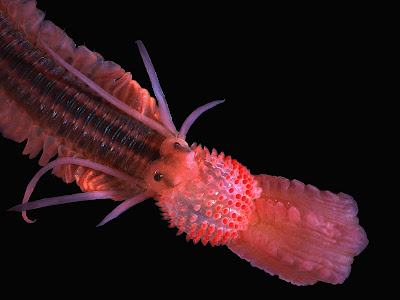Geoffrey sent me this link. But for the life of me, I can't find out any info about this critter. Are there any biologists or uglophiles out there that can enlighten me as to what the phyllodoce lineata is? If you can hook me up with the 411, then that will be your good deed for the day.
Also, don't forget Dagon the Fish God. He'll open the watery depths and send a shoal of bluefin tuna your way. That is wealth, baby!
Photo source: WikiMedia.org
Mar 15, 2007
Have the ID, Now Need the Info
Subscribe to:
Post Comments (Atom)


8 comments:
from wikipedia:
The Polychaeta or polychaetes are a class of annelid worms, generally marine. Each body segment has a pair of fleshy protrusions called parapodia that bear many bristles, called chaetae, which are made of chitin. Polychaeta means "many-bristled" (as opposed to the Oligochaeta which are "few-bristled"), and indeed the polychaetes are sometimes referred to as bristle worms. More than 10,000 species are described in this class. Common representatives include the lugworm (Arenicola marina) and the sandworm or clam worm Nereis.
What he said. Here's the taxonomy: http://species.wikimedia.org/wiki/Phyllodoce_lineata
I seem to only be able to find information about the genus of this worm on top of what's been posted.
Tree of life is always a good site for this but again, they only go to genus for polychaets :( It's an anti-vermiform-conspirasy I tells ya!
If I can find anything in my reference books when I get back home tomorrow. :)
Sounds like a relatively new discovery...they probably haven't decided on an official name for it yet. Beyond the Latin one, of course...
Some critters just have to make do with their taxonomic names. Must make schooltime a bummer, getting beaten up by all the other species with actual names and all... ;-)
--TwoDragons
ispecies.org links to some papers about it:
http://darwin.zoology.gla.ac.uk/~rpage/ispecies/?q=phyllodoce+lineata&submit=Go
That's a neat looking bug! :)
That's not an annelid worm! That's a baby Cthulhu!!! Kill it!!!!!!!!
anais - I'd LOVE to see Cthulhu end up somewhere in the scientific names of various marine critters. I think it could work. Just imagine:
Octopus imperius
or Octopus homoreixi
I'm not up on my rules of nomenclature but... still fun to imagine.
Post a Comment